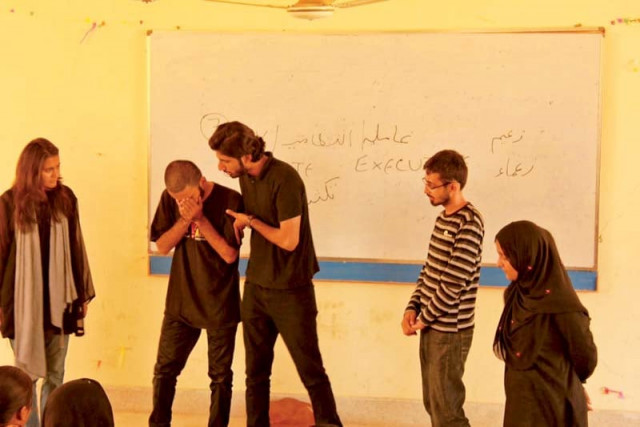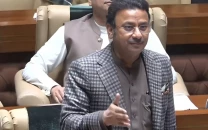Art for awareness: ‘Rise and raise your voice against harassment’
NSF members stage street theatre to bring menace into limelight

The one-act play is part of National Students Federations (NSF) ongoing campaign against sexual harassment. PHOTOS: COURTESY NSF
The one-act play is part of NSF's ongoing campaign against sexual harassment. On Friday, members of NSF staged the theatre act at the varsity's criminology department. Written and directed by NSF's KU unit secretary, Laila Raza, the play lasted for about seven minutes. It began with a young woman, seemingly frustrated, complaining about routine harassment. The men surrounding her first begin with the shame and victim-blaming, saying that she suffers from harassment because she wears 'modern' clothes and hence has no 'honour' or is taking revenge over a personal enmity by accusing people of harassment. Then they ask her to prove her claims, to which she replies that even those women who have proof are not believed in our society. Another woman, with her entire body covered up in black, comes forward to explain how when she was standing at the bus stop, a man passed by saying 'Masha Allah' and stopped at a distance to gawk at her despite her 'modest' attire.

The performers go on to define harassment as 'anything done to a person without their consent' be it saying something when a woman passes by or going to the extent of actually touching a person without their permission. Justifying these acts, one of the men says, "Yeh toh hum tafreeh mein kartay hain [We do this for the sake of fun only]." Nevertheless, one of the female performers comes forward to discuss how this 'fun' inflicts damage on a person who never sought unwanted attention.
Not exclusive to women
Perhaps the most intriguing part of the short play was when after the women, a young man comes to the fore and kneels. "I have also faced this," he says and begins to weep, after which his friends console him.

Talking about the real reason behind harassment, the lead character describes why it happens. "Harassment happens because we like to exert authority by being the creator of fear in someone else's eyes," she says. She adds that we all need to rise together and raise our voice against this menace that takes place in educational institutes, office settings and even in the confines of our homes. "Instead of asking someone to dress modestly, we need to change our mentality," she says.
Criticism for the sake of it?
While appreciations poured in as the audience, comprising mainly young students from different departments, applauded at the end of the play, a teacher from the sociology department seemed to have missed the message. "Are you implying that all women must wear burkas and all men must wear caps and hold rosaries in their hands to avoid harassment?" he asked. "We, as a society, are not ready to discuss such a sensitive topic perhaps and you should first sensitise people at homes before you stage such plays." Nevertheless, the performers explained that the only message they are giving is the need to change our collective mindset. A member of the audience said that while there is always room for improvement and suggestions are welcome, the initiative is laudable as none of the people criticising it have done anything practical of the sort.
Another female participant suggested that we should 'promote positivity' for effective communication. To this, NSF's Raza responded that if someone wants us to positively portray something as vile as harassment, it may not be possible.
NSF intends to continue with the one-act performances at different departments of KU in the coming days.
Published in The Express Tribune, October 1st, 2016.



















COMMENTS
Comments are moderated and generally will be posted if they are on-topic and not abusive.
For more information, please see our Comments FAQ